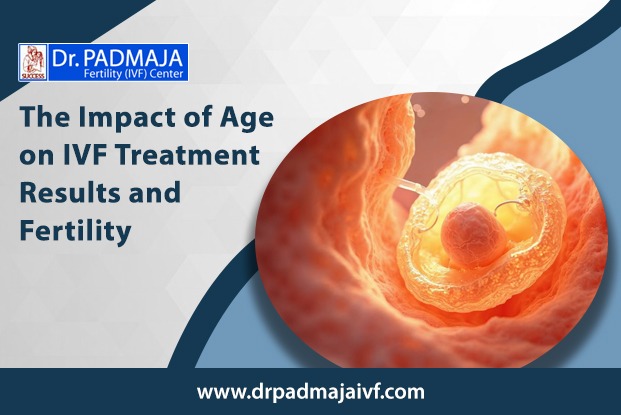Fertility is a deeply personal journey, and for many couples, in-vitro fertilization (IVF) offers hope when natural conception proves difficult. However, one factor that plays a critical role in fertility and IVF success rates is age. Understanding how age affects fertility can help individuals and couples make timely and informed decisions about their family planning.
Whether you’re in your late 20s or early 40s, this article sheds light on the relationship between age and IVF outcomes, and why seeking help from trusted experts like Dr Padmaja IVF Center—known as the best fertility centre in Hyderabad—can make all the difference.
How Age Affects Female Fertility
Women are born with a fixed number of eggs, and both the quantity and quality of these eggs decline over time. Fertility is generally at its peak during a woman’s 20s and early 30s.
This decline doesn’t just affect natural pregnancy but also the outcomes of assisted reproductive treatments such as IVF. One of the key issues is the rise in chromosomal abnormalities in eggs as women age, which can lead to lower fertilization rates, poor embryo quality, and a higher risk of miscarriage.
IVF Success Rates and Age: What to Expect
The effectiveness of IVF treatment in Hyderabad, as in other parts of the world, is strongly influenced by a woman’s age. Here’s a general breakdown of how age impacts IVF success rates:
Under 35: Highest success rates; more responsive ovaries and better egg quality.
Ages 35–37: Success is still comparatively high, but the quality of the eggs starts to deteriorate.
Ages 38–40: Moderate success; fewer eggs and greater risk of chromosomal issues.
Over 40: Less successful; may need more donor eggs or IVF treatments.
At DrPadmaja Fertility Center, one of the most advanced fertility treatment centers in Hyderabad, these challenges are met with cutting-edge technology and personalized care to give every woman the best possible chance of conception.
Why Age Matters for Men Too
While the impact of age on male fertility is less dramatic, it still matters. As men age, sperm motility and DNA integrity can decline, potentially affecting embryo development and pregnancy success. That’s why fertility evaluations for both partners are recommended, regardless of age.
When Should You Consider IVF?
In-vitro fertilization (IVF) is a well-established and effective assisted reproductive technology that has helped millions of couples worldwide conceive and build families. But knowing when to consider IVF can be crucial for maximizing success and reducing emotional, physical, and financial stress. Here’s a detailed guide on the circumstances under which IVF may be the right option.
The Dr Padmaja IVF Center, widely regarded as the best IVF center in Hyderabad, provides thorough assessments and tailor-made treatment plans to address age-related fertility issues. Their experienced team helps patients understand their options and move forward with confidence.
Fertility Preservation Options
For women who aren’t ready for motherhood but want to protect their chances for the future, fertility preservation techniques like egg freezing are available. Freezing eggs at a younger age ensures that high-quality eggs are available for use later when natural fertility may have declined.
DrPadmaja Fertility Center offers fertility preservation services using advanced vitrification methods, giving women control over their reproductive timeline.
The Role of Advanced Technology and Expert Care
Age-related fertility challenges can be mitigated with the help of the right medical support. Top fertility treatment centers in Hyderabad, like Dr Padmaja IVF Center, combine technology and human care to maximize success.
Services include:
Advanced IVF protocols tailored to your age and health profile
Minimal stimulation IVF for women with low ovarian reserve
Donor egg IVF as a viable option for older women
The compassionate team at DrPadmaja Fertility Center ensures that every patient receives individualized attention, emotional support, and the highest standards of clinical care.
Final Thoughts: Take Charge of Your Fertility
Age is a natural part of life, but it doesn’t have to be a barrier to parenthood. Thanks to advancements in reproductive medicine and the support of trusted specialists, many couples achieve their dream of having a baby—even in their late 30s or early 40s.
If you’re planning to start a family or are facing challenges with conception, don’t wait too long. Seek help from the best fertility centre in Hyderabad, where experts understand your concerns and work with you to turn hope into reality.
Dr Padmaja IVF Center and the team at DrPadmaja Fertility Center are here to guide you every step of the way, offering clarity, compassion, and clinical excellence in your fertility journey.
About the Author

This blog is penned by a devoted content specialist passionate about raising awareness around fertility treatments and emotional well- being. With in- depth disquisition on motifs like IVF and fertility, the thing is to give precious perceptivity for couples on their trip to parenthood.
Frequently Asked Questions (FAQs)
- How does age affect female fertility?
As women age, especially after 35, fertility begins to decline due to reduced egg quantity and quality. By age 40, the chances of natural conception drop significantly, and miscarriage risks increase.
- Why does egg quality decline with age?
Eggs age just like the rest of the body. Over time, they are more likely to have chromosomal abnormalities, which can affect fertilization, embryo development, and implantation success.
- What is the best age for a woman to undergo IVF?
Women under 35 generally have the highest IVF success rates. IVF is still possible for older women, but success rates decline sharply after 40, and many women in their 40s may consider using donor eggs.
- Does male age affect IVF success?
Yes, male fertility also declines with age, though more gradually. After age 40–45, sperm quality can decrease, affecting fertilization rates and increasing the risk of genetic disorders.
- Can IVF overcome age-related infertility?
IVF can help many age-related fertility issues, but it cannot completely overcome reduced egg quality. For women over 40, success rates are significantly lower unless donor eggs are used.
- Should older women consider egg freezing?
Yes, egg freezing is a good option for women in their late 20s to early 30s who want to delay pregnancy. It preserves younger, healthier eggs for use later, improving future IVF chances.
- Are there more complications in pregnancies at an older age?
Yes. Older pregnant women are at higher risk for gestational diabetes, high blood pressure, preterm birth, and cesarean delivery. Close medical supervision is essential.

